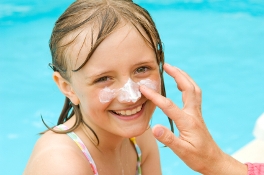 Vitamin D, a fat-soluble vitamin known as “the sunshine vitamin,” helps the body absorb calcium and prevents a number of diseases, particularly those relating to bone health. While the amount of vitamin D recommended in your diet will vary from person to person, it is widely regarded as an important part of nutrition and wellness.
Vitamin D, a fat-soluble vitamin known as “the sunshine vitamin,” helps the body absorb calcium and prevents a number of diseases, particularly those relating to bone health. While the amount of vitamin D recommended in your diet will vary from person to person, it is widely regarded as an important part of nutrition and wellness.
While vitamin D is naturally present in only a select few foods, most people know that our bodies can absorb vitamin through exposure to sunshine. As we head into the summer months, most skin health experts caution sunbathers everywhere against relying on the sun alone for their daily dose of vitamin D, as excessive amounts of sun can cause potentially fatal types of skin cancer.
Dr. Brooke Jackson, a board certified dermatologist and founder of the Skin Wellness Center of Chicago tells her patients to practice smart sun habits all year round, but especially as the weather heats up.
“There are a lot of misconceptions about vitamin D,” said Dr. Jackson, who once had a patient whose last doctor informed her not to wear sunscreen so she could get her vitamin D. “It’s very important to get the recommended amount of vitamin D, but you can just as easily get it from drinking fortified milk or taking a dietary supplement. People haven’t died from vitamin D deficiency, but they have died from skin cancer.”
Since it’s inevitable that we’ll all spend some time outdoors during the spring and summer seasons, Dr. Jackson says that it is extremely important to wear a sunblock every day.
“Choose sunblock instead of sunscreen,” Dr. Jackson said. “Sunscreen is like the screen in your windows, allowing penetration of some rays, about 89% filter. Sunblock is more protective. It often has physical blockers like titanium dioxide and will filter out about 97% of UV rays giving maximum protection against the sun at an early age.”
When you head outdoors this season, whether it’s to build sand castles on the beach or barbecue under the afternoon sun, be sure to keep skin safety in mind, even if you plan to catch a few rays.
 Don’t forget the kids: If you have children, it’s especially important to make sure they lather up. According to Dr. Jackson, sunburns and large amounts of sun exposure at a young age (prior to age 18) can put people at a higher risk for skin cancer later in life. Parents should talk to their kids about sun safety just like they would about avoiding smoking or drugs, as it can help them lead a lifetime of better health.
Don’t forget the kids: If you have children, it’s especially important to make sure they lather up. According to Dr. Jackson, sunburns and large amounts of sun exposure at a young age (prior to age 18) can put people at a higher risk for skin cancer later in life. Parents should talk to their kids about sun safety just like they would about avoiding smoking or drugs, as it can help them lead a lifetime of better health.
Make sunblock part of your routine: You wouldn’t leave the house in the morning without brushing your teeth, so practice the same habits when it comes to sunscreen. Apply sunblock before you hit the park or pool – at least 20 minutes before going outdoors.
Keep your clothes on: This sounds self-explanatory, but if you feel as though you’re getting too much sun, it can help to wear a t-shirt, tunic or bathing suit cover up when you’re outdoors. A t-shirt has an SPF of 8, so if you ever run out of sunblock at the beach, covering up is better than nothing. In fact, some clothing lines have made swimsuits that have SPF protection built right into the fabric.
Choose a number: We’ve all seen bottles of sunscreen labeled “SPF” but few of us know what it means. An SPF factor means sun protection factor. If you were going to burn in one minute and you put an SPF 30 on, that means it would take you 30 minutes to get the same amount of damage. Be sure to choose an SPF of 30 on a daily basis. If you are heading out to the beach or park, go a bit higher like SPF 55 or 60.
